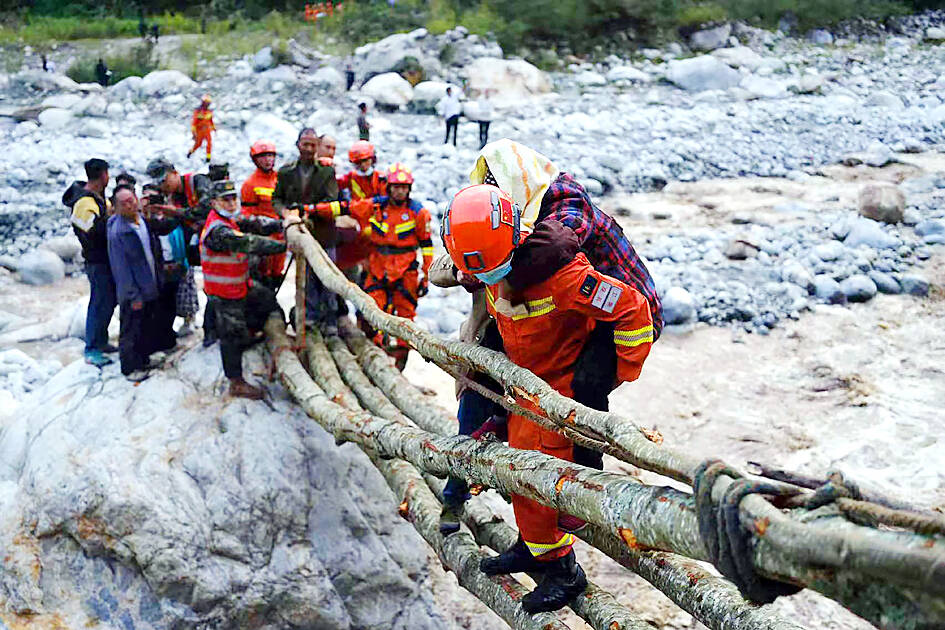President Tsai Ing-wen (蔡英文) yesterday expressed sympathy to those affected by a magnitude 6.8 earthquake that struck China’s Sichuan Province the previous day, as fire officials said that a rescue team is prepared to help.
The death toll from the strongest earthquake to hit Sichuan since 2017 rose to 66 yesterday, and more than 250 people were injured in the disaster, Chinese state media said.
Apart from voicing concern over those who were killed or injured in the disaster and their family members, the president hopes for a quick recovery and a return to normal life there, Presidential Office spokesman Xavier Chang (張惇涵) said.

Photo: AFP
No Taiwanese nationals have been hurt or stranded in Sichuan, and the president has asked the Mainland Affairs Council and related government agencies to closely monitor the situation, he added.
The National Fire Agency said in a statement that it has assembled a rescue team of 40 people, one search dog and 5 tonnes of equipment that could immediately leave upon instruction from the Ministry of Foreign Affairs or the council, adding that it was “committed to the spirit of humanitarian care and disaster relief without borders.”
China has not said whether it would allow in overseas teams to help with search-and-rescue operations.
At the site of the earthquake, Chinese firefighters yesterday worked in treacherous terrain to help evacuate more than 11,000 people.
State media footage, taken at the epicenter in Luding County, showed firefighters stretchering an injured person across a makeshift bridge built with tree trunks as muddy torrents raged below them.
Evacuees who could walk followed a trail of scree alongside the river abutting slopes stripped of soil cover by Monday’s quake. Some of them were clutching onto their belongings while others carried injured people on their backs, a video from local media showed.
In another video, firefighters were seen carrying a woman on a stretcher, covered in dust and missing a shoe, out from a dangerously teetering four-story wooden building.
As rescuers tried to reach stranded people, restore utilities and send emergency relief, state media reported 11,000 people had been evacuated from the area.
Authorities had identified about 500 potential geological hazards, reports said, referring to landslides and collapsed mountain roads.
State television reported that more than 200 people were still stranded in Hailuogou, a popular tourist spot known for its glaciers, verdant forests and soaring peaks. Rescuers were working to reopen roads to reach them.
In Luding, power and water infrastructure and telecommunications were severely damaged, state television said.
It also reported that 243 houses had collapsed and 13,010 had been damaged. Four hotels and hundreds of tourist lodgings were also affected.
The quake cut power to several towns, while various highways collapsed and seven small-to-mid-sized hydropower stations were damaged.
With heavy rains expected over the next three days, experts yesterday flagged risks posed by a number of dammed lakes that have formed after the quake.
Authorities were considering using drones to inspect the situation upstream of Wandong River, the main tributary of the Dadu River.

The CIA has a message for Chinese government officials worried about their place in Chinese President Xi Jinping’s (習近平) government: Come work with us. The agency released two Mandarin-language videos on social media on Thursday inviting disgruntled officials to contact the CIA. The recruitment videos posted on YouTube and X racked up more than 5 million views combined in their first day. The outreach comes as CIA Director John Ratcliffe has vowed to boost the agency’s use of intelligence from human sources and its focus on China, which has recently targeted US officials with its own espionage operations. The videos are “aimed at

STEADFAST FRIEND: The bills encourage increased Taiwan-US engagement and address China’s distortion of UN Resolution 2758 to isolate Taiwan internationally The Presidential Office yesterday thanked the US House of Representatives for unanimously passing two Taiwan-related bills highlighting its solid support for Taiwan’s democracy and global participation, and for deepening bilateral relations. One of the bills, the Taiwan Assurance Implementation Act, requires the US Department of State to periodically review its guidelines for engagement with Taiwan, and report to the US Congress on the guidelines and plans to lift self-imposed limitations on US-Taiwan engagement. The other bill is the Taiwan International Solidarity Act, which clarifies that UN Resolution 2758 does not address the issue of the representation of Taiwan or its people in

US Indo-Pacific Commander Admiral Samuel Paparo on Friday expressed concern over the rate at which China is diversifying its military exercises, the Financial Times (FT) reported on Saturday. “The rates of change on the depth and breadth of their exercises is the one non-linear effect that I’ve seen in the last year that wakes me up at night or keeps me up at night,” Paparo was quoted by FT as saying while attending the annual Sedona Forum at the McCain Institute in Arizona. Paparo also expressed concern over the speed with which China was expanding its military. While the US

SHIFT: Taiwan’s better-than-expected first-quarter GDP and signs of weakness in the US have driven global capital back to emerging markets, the central bank head said The central bank yesterday blamed market speculation for the steep rise in the local currency, and urged exporters and financial institutions to stay calm and stop panic sell-offs to avoid hurting their own profitability. The nation’s top monetary policymaker said that it would step in, if necessary, to maintain order and stability in the foreign exchange market. The remarks came as the NT dollar yesterday closed up NT$0.919 to NT$30.145 against the US dollar in Taipei trading, after rising as high as NT$29.59 in intraday trading. The local currency has surged 5.85 percent against the greenback over the past two sessions, central